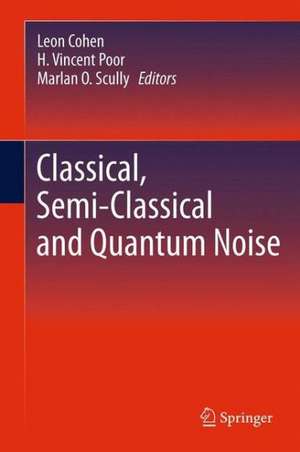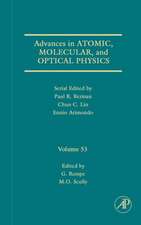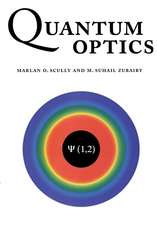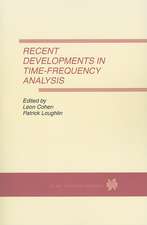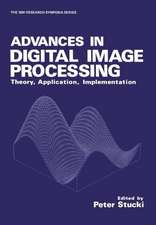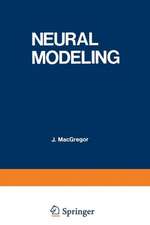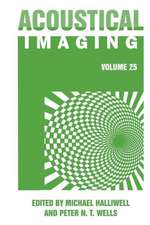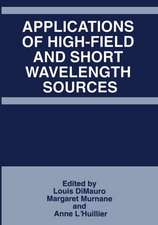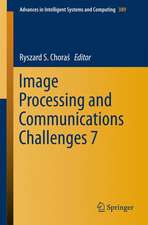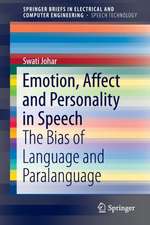Classical, Semi-classical and Quantum Noise
Editat de Leon Cohen, H. Vincent Poor, Marlan O. Scullyen Limba Engleză Paperback – 3 mar 2014
Focusing on classical noise modeling and applications, Classical, Semi-Classical and Quantum Noise includes coverage of statistical communication theory, non-stationary noise, molecular footprints, noise suppression, Quantum error correction, and other related topics.
| Toate formatele și edițiile | Preț | Express |
|---|---|---|
| Paperback (1) | 1108.51 lei 6-8 săpt. | |
| Springer Us – 3 mar 2014 | 1108.51 lei 6-8 săpt. | |
| Hardback (1) | 1114.65 lei 6-8 săpt. | |
| Springer Us – 21 dec 2011 | 1114.65 lei 6-8 săpt. |
Preț: 1108.51 lei
Preț vechi: 1351.83 lei
-18% Nou
Puncte Express: 1663
Preț estimativ în valută:
212.14€ • 220.66$ • 175.13£
212.14€ • 220.66$ • 175.13£
Carte tipărită la comandă
Livrare economică 14-28 aprilie
Preluare comenzi: 021 569.72.76
Specificații
ISBN-13: 9781489994479
ISBN-10: 1489994475
Pagini: 308
Ilustrații: X, 298 p.
Dimensiuni: 155 x 235 x 16 mm
Greutate: 0.44 kg
Ediția:2012
Editura: Springer Us
Colecția Springer
Locul publicării:New York, NY, United States
ISBN-10: 1489994475
Pagini: 308
Ilustrații: X, 298 p.
Dimensiuni: 155 x 235 x 16 mm
Greutate: 0.44 kg
Ediția:2012
Editura: Springer Us
Colecția Springer
Locul publicării:New York, NY, United States
Public țintă
ResearchCuprins
1.David Middleton.- 2. Sequential Bayesian Detection: A Model-Based Approach.- 3. The Propagation of Noise fields in a Dispersive Medium.- 4. How Does Noise Affect a Quantum State.- 5. Graph Theoretic Methods in Coding Theory.- 6. The Statistics of the Atomic Clock Noise.- 7. Effect of Noise on Quantized Adiabatic Charge Transport in 2D Electron Systems and Nanotubes.- 8. The Ubiquitous Matched Filter: A Tutorial and Application to Radar Detection.- 9.Noise-Driven Informatics: Secure Classical Communications Via Wire and Noise-Based Computing.- 10. Denoising and Time-Frequency Analysis of Signals.-11. Electromagnetically Induced Transparency with Fields Spectrally Broadended by Phase Noise.- 12. Multiple-Access Interference.- 13. Classical Capacities of Bosonic Channels.- 14. Ghost Imaging and Quantum Interference.- 15. Milestones in the History of Probability.- 16. Fluctuations in Two Component Interacting Bose-Einstein Condensate.- 17. Entanglement Criteria for Continuous-Variable Systems.- 18. Quantum Carpets: Factorization with Degeneracies.- 19. Co-Channel Interference Modeling and Analysis in a Poisson Field of Interferers in Wireless Communications.- 20. Introduction to “Non-Gaussian Statistical Communication Theory.”
Textul de pe ultima copertă
David Middleton was a towering figure of 20th Century engineering and science and one of the founders of statistical communication theory. During the second World War, the young David Middleton, working with Van Fleck, devised the notion of the matched filter, which is the most basic method used for detecting signals in noise. Over the intervening six decades, the contributions of Middleton have become classics. This collection of essays by leading scientists, engineers and colleagues of David are in his honor and reflect the wide influence that he has had on many fields. Also included is the introduction by Middleton to his forthcoming book, which gives a wonderful view of the field of communication, its history and his own views on the field that he developed over the past 60 years.
Focusing on classical noise modeling and applications, Classical, Semi-Classical and Quantum Noise includes coverage of statistical communication theory, non-stationary noise, molecular footprints, noise suppression, Quantum error correction, and other related topics.
Focusing on classical noise modeling and applications, Classical, Semi-Classical and Quantum Noise includes coverage of statistical communication theory, non-stationary noise, molecular footprints, noise suppression, Quantum error correction, and other related topics.
Caracteristici
Contains chapters by important figures in the field Focuses on classical noise modeling and applications Includes information on statistical communication theory, nonstationary noise, and molecular footprints Discusses noise suppression and quantum error correction
